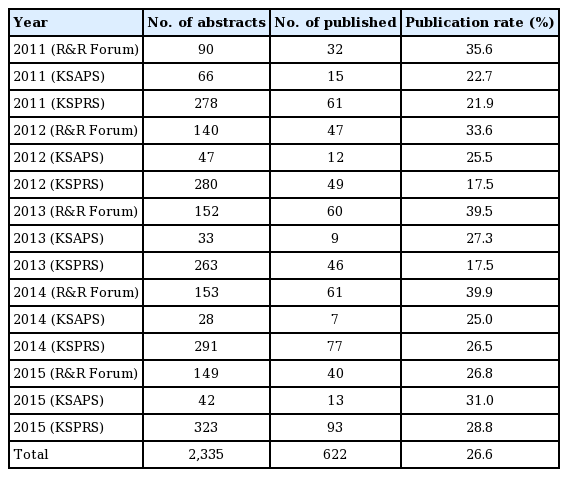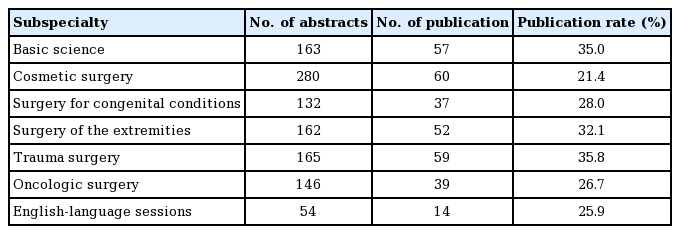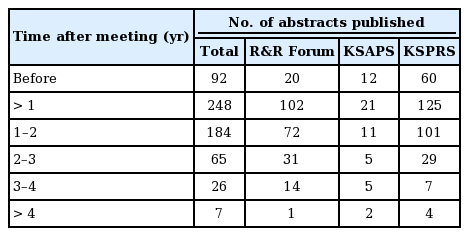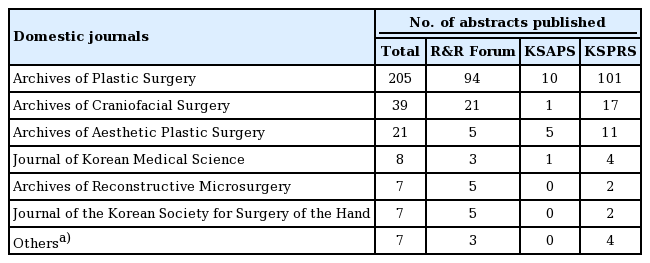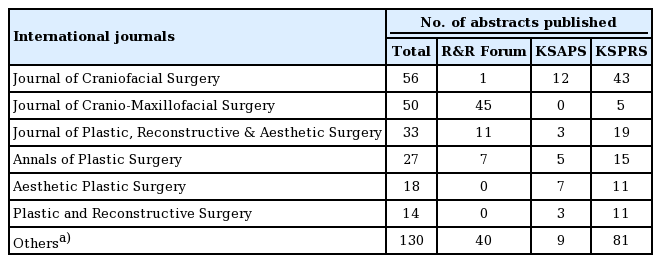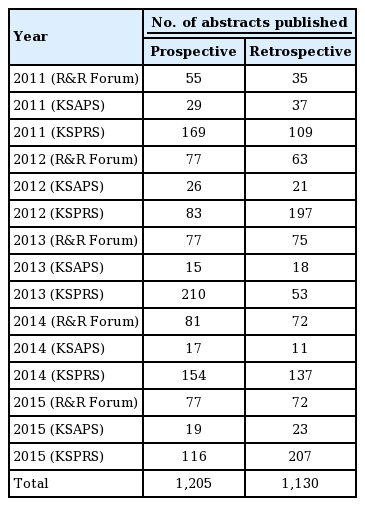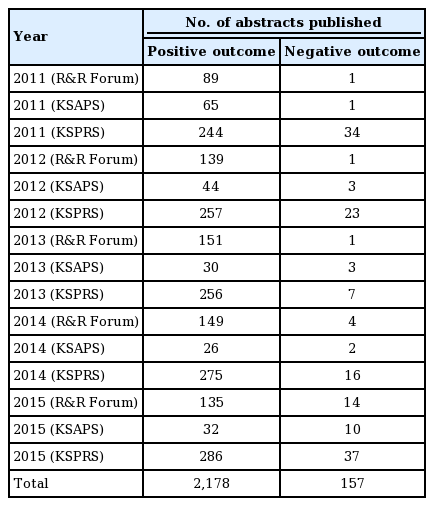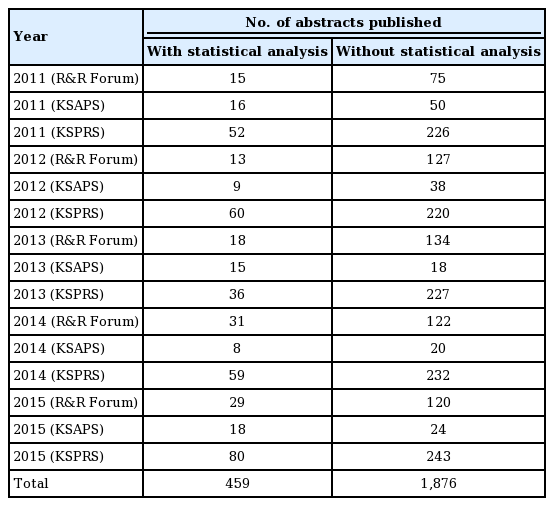Publication rate of presentations at Korean plastic surgery meetings: The R&R Forum, KSAPS, and KSPRS (2011–2015)
Article information
Abstract
Background
Since the initial Research and Reconstruction Forum (R&R Forum) in 2011, the R&R Forum, Korean Society for Aesthetic Plastic Surgery (KSAPS), and Korean Society of Plastic and Reconstructive Surgeons (KSPRS) have held annual meetings. This study was conducted to provide updated information on the publication rate of presentations at those meetings.
Methods
Plastic surgery–related abstracts presented at the R&R Forum, KSAPS, and KSPRS between 2011 and 2015 were collected. The sessions were divided into free papers, posters, and e-presentations (or e-posters) for each annual meeting. Abstract publication status was confirmed through PubMed, Google Scholar, the KCI-Korean Journal Database, and the KMbase database.
Results
In total, 2,335 abstracts were presented in the free paper, poster, and e-presentation sessions. Of these, 622 (26.6%) were published. The overall publication rates were 240 of 684 abstracts (35.1%) presented at the R&R Forum, 56 of 216 abstracts (25.9%) presented at the KSAPS meetings, and 326 of 1,435 abstracts (22.7%) presented at the KSPRS meetings. In terms of specific annual meetings, the 2014 R&R Forum had the highest publication rate (39.9%), followed by the 2015 KSAPS (31.0%) and the 2015 KSPRS (28.8%).
Conclusions
Scientific researchers present diverse results at these professional meetings, with a focus on innovative surgical techniques and improved surgical outcomes. This is our second study on this topic. Despite its limitations, this study indirectly shows that the recognition of Korean plastic surgeons and the quality of the annual meetings of Korean societies of plastic surgery have risen to the global level.
INTRODUCTION
Professional annual meetings present a variety of scientific research results, with well-organized presentations that focus on ideal and innovative surgical techniques and improved surgical outcomes. The publication rate of presentations in medical journals can be used to assess the relevance of annual scientific meetings [1]. An early study reported a full publication rate of 51% for presented abstracts [2], which decreased to 45% (range, 11%–78%) in an update published by the same author in 2007 [3].
In 2012, we first studied the full publication rate of abstracts presented at the Korean Society of Plastic and Reconstructive Surgeons (KSPRS) meeting, the largest academic society dedicated to plastic and reconstructive surgery in Korea [4]. Currently, the KSPRS, Research and Reconstruction Forum (R&R Forum), and Korean Society for Aesthetic Plastic Surgery (KSAPS) are representative annual scientific meetings focusing on plastic surgery in Korea. Since the initial R&R Forum in 2011, the KSPRS has held two scientific meetings a year: the R&R Forum and the KSPRS annual meeting. These annual scientific meetings include presentations on the subspecialties of basic science, cosmetic surgery, surgery for congenital conditions, surgery of the extremities, trauma surgery, and oncologic surgery within the broader field of plastic surgery. The KSPRS includes presentations on all subspecialties of research and surgery, whereas the R&R Forum deals with all subspecialties except cosmetic surgery, and the KSAPS focuses more on cosmetic surgery and shares information between presenters and discussants. Therefore, we hypothesized that differences in the subspecialties represented at each annual scientific meeting would affect the publication rate. Despite some limitations, we conducted a previous study analyzing the full publication rate of the abstracts presented at the KSPRS meeting in 2012. That was the first study to investigate the publication rate following an annual meeting related to plastic surgery in Korea.
The purpose of this study was to provide updated information on the full publication rate of presentations at annual meetings and to expand upon the analysis of the prior study by addressing its limitations. In addition, data from the annual scientific meetings of the KSPRS, R&R Forum, and KSAPS were analyzed to survey the range of information presented at these annual scientific meetings.
METHODS
The abstracts presented at the annual scientific meetings of the R&R Forum, KSAPS, and KSPRS between 2011 and 2015 were collected. The abstracts were analyzed by six independent investigators between July 1, 2018 and July 31, 2018. First, to collect the abstracts presented at each annual scientific meeting, we obtained the program book from each meeting and program files for each year from the corresponding society’s website. In the resulting database, the sessions of each annual scientific meeting were divided into free papers, posters, and e-presentations (or e-posters). We then used this database to determine whether the abstracts were published. Abstract publication status was confirmed through PubMed, Google Scholar, the KCI-Korean Journal Database, and the KMbase database. We searched for the family name and initials of the first author or coauthor. Next, the abstract title and key words were searched. If the same affiliations were present in the abstracts from the conference presentation and the journal publication, we used the name of the corresponding institution. We determined that an abstract had been published when the institution and one or more author’s names were listed, and when the conclusion of the full paper was consistent with the abstract.
Presentations were classified by session type (oral, poster, e-presentation, or e-poster), affiliation (teaching hospital, private clinic, or a combination of the two), and subspecialty. Free papers were categorized by subspecialty based on the session where they were orally presented (basic science, cosmetic surgery, surgery for congenital conditions, surgery of the extremities, trauma surgery, oncologic surgery, and English-language sessions). Posters and e-presentations were not analyzed by subspecialty because they were not categorized as such in the abstract books. The time to full publication was defined as the elapsed time from the month of presentation to the month of publication. Abstracts published before the corresponding presentation were excluded. We classified the journals of publication as domestic or international. The overall publication rate was defined as the percentage of abstracts published in journals among the abstracts presented at each annual scientific meeting. The publication rate was investigated for each annual scientific meeting. In addition, abstracts were classified according to study design (prospective or retrospective), statistical analysis (present or absent), and study outcome (positive or negative). The Pearson chi-square test was used in SPSS version 19.0 (IBM Corp., Armonk, NY, USA) to determine the significance of differences in the publication rate according to the annual meeting, type of presentation, affiliation, subspecialty, study design, type of outcome, and statistical analysis. P-values <0.05 were considered to indicate statistical significance.
RESULTS
The R&R Forum, KSAPS, and KSPRS meetings have been held annually since 2011. During the 15 annual meetings between 2011 and 2015, the total number of abstracts presented in the free paper, poster, and e-presentation sessions was 2,335. Of these, 622 (26.6%) were eventually published in journals. The overall publication rates were 240 of 684 abstracts (35.1%) presented at the R&R Forum, 56 of 216 abstracts (25.9%) presented at the KSAPS meetings, and 326 of 1,435 abstracts (22.7%) presented at the KSPRS meetings. The annual meeting publication rate was the highest at 39.9% for the R&R Forum in 2014, followed by the 2015 KSAPS (31.0%) and 2015 KSPRS (28.8%), and the lowest rate (17.5%) was found for the 2013 KSPRS. There was no significant difference in the publication rates among the annual meetings (P=0.289) (Table 1). The publication rates according to presentation type were 28.9% (318 of 1,102) of oral presentations, 23.5% (166 of 705) of posters, and 26.1% (138 of 528) of e-presentations (P=0.198) (Table 2). The publication rate of presentations by authors from teaching hospitals was 28.1% (560 of 1,991), that of presentations by authors from private clinics was 14.6% (19 of 130), and that of presentations by authors with combined affiliations was 20.1% (43 of 214) (P=0.288) (Table 3). The publication rates by subspecialty were 35.0% for basic science, 21.4% for cosmetic surgery, 28.0% for surgery for congenital conditions, 32.1% for surgery of the extremities, 35.8% for trauma surgery, 26.7% for oncologic surgery, and 25.9% for English-language presentations (P=0.636) (Table 4). Except for 92 abstracts (14.8%) published before the presentation date, the average time to full publication was 15.48 months. Abstracts published within 2 years accounted for 81.5% of the publications (432 of 530) (Table 5). The abstracts were published in domestic or foreign journals (Tables 6 and 7). Fifteen domestic journals accounted for 47.3% of the total published abstracts. Among these, the number of abstracts presented at the KSPRS was the largest (141 of 294). The top three domestic journals in terms of the number of publications were Archives of Plastic Surgery (APS) (205 of 294), Archives of Craniofacial Surgery (ACFS) (39 of 294), and Archives of Aesthetic Plastic Surgery (AAPS) (21 of 294). The abstracts presented at the R&R Forum were more likely to be published in domestic journals (136 of 240). Additionally, 328 presentations were published in 65 international journals (52.7%), and presentations at the KSPRS meeting accounted for most of these publications (185 of 328). The top three international journals in terms of the number of publications were the Journal of Craniofacial Surgery (56 of 328), Journal of Cranio-Maxillofacial Surgery (50 of 328), and Journal of Plastic, Reconstructive & Aesthetic Surgery (33 of 328). Prospective studies accounted for 51.6% of the surveyed abstracts (1,205 of 2,335) (P=0.049) (Table 8). Of the annual conferences, the R&R Forum had the highest proportion of prospective studies, at 53.7% (367 of 684). The overwhelming majority of abstracts (93.3%; 2,178 of 2,335) presented positive outcomes (P=0.003) (Table 9). Similarly, most abstracts were studies with no statistical analysis (80.3%; 1,876 of 2,335) (P<0.001) (Table 10).
DISCUSSION
This study reviewed the publication rate of abstracts presented at three annual scientific meetings held by Korean societies of plastic surgeons in comparison with the publication rate reported in our previous study of the KSPRS meeting. Two previous consecutively-published studies on the publication rate of abstracts presented in the plastic and reconstructive surgery field in the same country were identified. In 2003, Oliver et al. [5] stated that the publication rate for five meetings of the British Association of Plastic Surgeons between 1995 and 1999 was 32% (range, 23%–54%). In 2010, Kain et al. [6] stated that the publication rate of abstracts presented at the 2007 British Association of Plastic, Reconstructive and Aesthetic Surgeons meetings was 22%.
The total publication rate of abstracts presented at the KSPRS, R&R Forum, and KSAPS, the leading Korean academic societies dedicated to plastic surgery, was 26.5%, which is lower than the publication rate of 38.7% found in our 2012 study [4]. This rate is similar to that described for British annual meetings [5,6], and is lower than the publication rate reported by a Cochrane study in 2007 by Scherer et al. [3] (45%). We believe that the reason for the lower overall publication rate in the field of plastic and reconstructive surgery is that the content of presented abstracts was assessed according to strict criteria, one of which was that the studies must not have been previously presented as full papers. The reason for the decreased publication rate relative to the results of our 2012 study is believed to be the increase in the total number of speakers, as the scale of the annual meetings has grown. In 2010, Kain et al. [6] gave three reasons for the observed decline in the publication rate. First, many of the presented abstracts were not even submitted for publication. Second, the evaluation process for abstracts was stricter than that followed by other journals. Last, abstracts may have been in the process of being accepted or submitted.
Our findings can be interpreted indirectly as indicating that the quality of research results in plastic surgery remains high. The highest publication rate was observed for the R&R Forum (35.1%), followed by the KSAPS (25.9%) and the KSPRS (22.7%). This trend is thought to be due to the lack of an aesthetic session at the R&R Forum. Likewise, the lower publication rate of abstracts presented at the KSAPS may be explained by the fact that it primarily includes sessions dedicated to aesthetic surgery. We also hypothesized that the type of presentation and affiliation of the author could affect the publication rate because in the 2012 study, higher publication rates were found for oral presentations and presentations by authors from teaching hospitals. Similarly, in the present study, the publication rates for oral presentations (28.9%) and presentations by authors from teaching hospitals (28.1%) were higher than those of other studies. This trend was found for each annual meeting. As previous research has suggested [4], a higher publication rate indicates that high-quality oral presentations are preferred at annual meetings. In addition, most abstracts (85.3%) were presented by authors from teaching hospitals, and those abstracts had a higher publication rate (28.1%) than presentations by authors from other institutions. The publication rate according to subspecialty was analyzed in seven additional English sessions. Previous studies have found the highest publication rate to be at the basic science sessions, but in this study, the trauma surgery sessions had the highest rate (35.8%). There was a significant difference between these two types of sessions (P=0.008). The lowest publication rate was found for the cosmetic surgery session (21.4%), which is consistent with previous studies. The average length of time from presentation to publication was 15.48 months. This is lower than the interval of 2 to 4 years [7-10] for the publication of abstracts published in other professional and scientific journals.
Among the domestic journals where studies were eventually published, APS accounted for 69.7%, ACFS for 13.3%, and AAPS for 7.1%. Among the international journals, the Journal of Craniofacial Surgery accounted for 17.1% of the published abstracts, the Journal of Cranio-Maxillofacial Surgery for 15.2%, and the Journal of Plastic, Reconstructive & Aesthetic Surgery for 10.1%. In total, there were 15 domestic journals and 74 international journals. Among domestic journals, APS showed a markedly higher proportion of publications, but no significant difference was found among international journals.
Our previous study found that abstracts were published in 20 domestic and 14 international journals, and that 87.4% of the abstracts were published in domestic journals. The abstracts surveyed in this study were published in 15 domestic and 74 foreign journals, and 52.7% (328 of 622) were published in domestic journals. This finding indicates that English-language ability, which was a limitation of previous studies, has improved, and that Korean plastic surgeons perform excellent research. The distribution of publications across journals was found to be similar to that reported in previous research, showing that some journals have continued to remain influential in the field of plastic surgery. In particular, although the proportion of publications in APS decreased slightly compared to previous results, APS still accounted for the highest percentage, proving that the status of APS remains excellent in comparison to other domestic and international journals. Additionally, the publication rate was studied according to study design, study outcome, and the presence of a statistical analysis, all of which were identified as limitations in previous studies. Higher publication rates were found for prospective studies, those with positive outcomes, and those without a statistical analysis. We expected the opposite trend for studies containing a statistical analysis, but the small proportion of such studies may explain why we arrived at the opposite conclusion.
There are some limitations to our study. First, we could not investigate the content of all the abstracts. Since the content was only available in the abstract book or in the published papers, it is possible that content could only be obtained for 2,255 of the 2,335 abstracts (96.6%), resulting in selection bias. Second, although six independent investigators—more than in the previous study—reviewed the results, it was not possible to completely rule out the possibility of selection bias, because the investigators did not meet with all authors in person to confirm that certain abstracts were published. Finally, it is possible that research funding affected publication speed, but this was not investigated because the content of the abstracts was not available.
In conclusion, despite its limitations, our second study indirectly shows that the recognition of Korean plastic surgeons and the quality of the annual meetings of Korean societies of plastic surgery have risen to the global level.
Notes
No potential conflict of interest relevant to this article was reported.
Author contribution
Conceptualization: Lee JH, Kim TG, Chung KJ. Data curation: Choi M, Kang CS. Formal analysis: all authors. Funding acquisition: Lee JH. Methodology: all authors. Project administration: all authors. Visualization: all authors. Writing - original draft: Lee JH. Writing - review & editing: Choi M. Approval of final manuscript: all authors.

